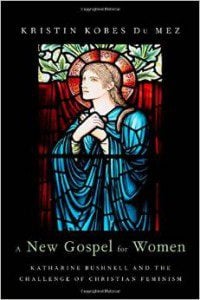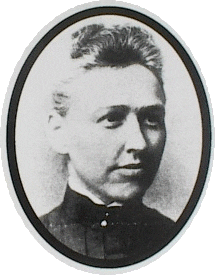Today’s guest post is from Kristin du Mez, Associate Professor of History at Calvin College. Her A New Gospel for Women: Katharine Bushnell and the Challenge of Christian Feminism has just been published with Oxford University Press.
 “If conservative churches preach the dominance of men, and submission of women, does this add weight to those who think men have a right—even a divine right—to control their partners?”
“If conservative churches preach the dominance of men, and submission of women, does this add weight to those who think men have a right—even a divine right—to control their partners?”
This was the question Australian journalist Julia Baird asked a few weeks back in the pages of the Sydney Morning Herald.
Baird posed this question in response to the growing public awareness of the problem of domestic abuse in Australian society, a discussion which—until then—had largely ignored the role of religion.
Baird’s column provoked an impassioned response, with one woman after another writing in with stories of abuse they had suffered at the hands of Christian men. Baird included some of these accounts in a follow-up article in which she described how some women had been instructed by pastors to stay with abusive husbands, or advised that more frequent sex might mitigate the abuse.
One woman who responded to Baird wrote her own letter to the Sydney Morning Herald, recounting in painful detail how she had been subjected to abuse at the hands of a “supposedly” Christian husband, one who provided her with “lists with highlighted sections of Bible passages about nagging wives and how [she] should submit to him.”
The question Baird posed is a critical one for the Christian church: “Can emphasis in some churches on the doctrine of headship—that man is the head of woman, and women are to voluntarily submit—create a climate where men who seek to abuse their wives are enabled?”
The answer to this question, however, is not a straightforward one.
Few would argue that conservative Christian men have a monopoly on abuse. Indeed, in America, recent scandals that have brought discussions of abuse to the fore in the Christian community have spanned the theological spectrum—from the treatment of rape victims at conservative Christian colleges to accusations of domestic abuse alleged against a prominent egalitarian emergent church leader.
And yet, many would agree that a serious reflection on abuse in Christian circles—and of the possible role of Christian theology in fostering a culture of abuse—is long overdue, not only in the United States and Australia, but among the global Christian community as a whole.
History makes clear, however, that this isn’t the first time Christian women have asked precisely the question Baird has raised: Is there a direct relationship between Christian patriarchy and violence against women?
Over a century ago, a woman by the name of Katharine Bushnell asked this very question. An American Methodist and social reformer, Bushnell campaigned to end prostitution and advocated for the rights of “fallen women”—in America, throughout the British Empire, and across the globe.
Bushnell’s activism repeatedly introduced her to Christian men guilty of treating women with appalling cruelty, and then of condemning those women to lives of shame.
Ultimately, she concluded that Christian theology must be to blame.
But unlike others who believed that Christianity contributed to the subjection of women, she refused to abandon her Christian faith. Equipped with a knowledge of the biblical languages, she argued that the theological basis of men’s cruelty towards women was rooted not in the inspired word of God, but rather in misogynistic mistranslations of the original text.
Drawing on prodigious research, Bushnell took aim at traditional notions of “male headship.”
Not one to mince words, Bushnell accused men of essentially giving free reign to their own egotism under the cover of “headship.” Men had created and defended “a whole fossilized system of theology,” one that made “one half the human family some resplendent glory which the other half is appointed to reflect and manifest forth.” And the “glorified and spiritualized half of humanity” assigned themselves the task of teaching theology to the other half.
Indeed, Bushnell was convinced that the only way men were able to keep women confined to lives of servitude and submission was by “binding them down to ignorance and superstition,” and that only by repudiating such theology could women be free to participate in “the glorious liberty of the children of God.”
Bushnell explicitly linked the doctrine of male headship to the abuse of women. In fact, she went so far as to claim that “subordination was abuse”: “Man would feel abused if enslaved to a fellow man,” she insisted, and the same was true of women, even if theologians liked to consider women’s subjugation “the happiest state in which a woman can exist.” (She noted, too, that it was “the male theologian and not the female victim who pronounces the state a happy one.”)
But what theologians taught to be “God-ordained marriage” in fact robbed women of their “will and wishes,” and thus amounted to nothing less than “the sexual abuse of the wife by the husband.”
And Bushnell believed that a husband’s claim of headship over his wife affected the status of all women: “Men cannot make unquestioning, obedient slaves of wives only—sooner or later the iniquity of slavery will be visited upon the head of unmarried women also; for iniquity knows not the name of restriction.”
Bushnell rejected any notion that equality and submission could go hand in hand. “The wife cannot obey while recognizing her equality with her husband, without also realizing his injustice,” she insisted. And the husband “cannot command a wife who is his equal without his conscience accusing him of wrong.”
She was puzzled by men who claimed to follow Christ— the incarnate God who emptied himself and submitted to death on a cross—by claiming power over women. Only a sinner would desire “to exalt himself and have dominion over others,” she contended. And he would do so “in exact proportion to the degree of selfishness in his heart.”
But she claimed that Christ “would never encourage the husband to imitate Adam and antichrist in trying to be ‘as God,’ to woman, and to interfere with Christ’s authority over His own servant,—woman.” Those who interpreted Paul’s words to justify male headship had misconstrued Paul’s words, and disregarded the “revolutionary ethics of a Christ-like love.”
In her effort to combat misogynistic traditions of biblical interpretation, Bushnell wrote God’s Word to Women (1916, 1923), a fascinating feminist theology that offered intriguing new translations and interpretations of the biblical text, from Genesis through Revelation. Remarkably, she advanced her revolutionary claims while staunchly adhering to the infallible authority of the Scriptures.
It is worth noting that although Bushnell initially undertook her theological investigations in order to understand the actions of Christian men, the bulk of her writing centered around a new reading of the Scriptures that told the story of women’s social and spiritual empowerment—one that equipped women to be “strong, in body, mind and spirit,” and one that situated the liberation of women at the very heart of the Gospel.
Bushnell’s book received favorable reviews from a number of biblical scholars in England, America, and Australia, but it failed to reach a wide readership in her own day. Even so, for nearly a century it has served as an important resource for Christian women seeking to combat abuse, particularly abuse that takes place at the hands of Christian men.
For a new generation of Christians reawakening to the problem of abuse, within the church and beyond, and for activists working to end the trafficking of women, at home and abroad, Bushnell’s life and writings provide a compelling model of Christian engagement—one that takes theology seriously, one that privileges women’s voices, and one that offers a critique of patriarchy that is rooted in the message of the Christian gospel.












